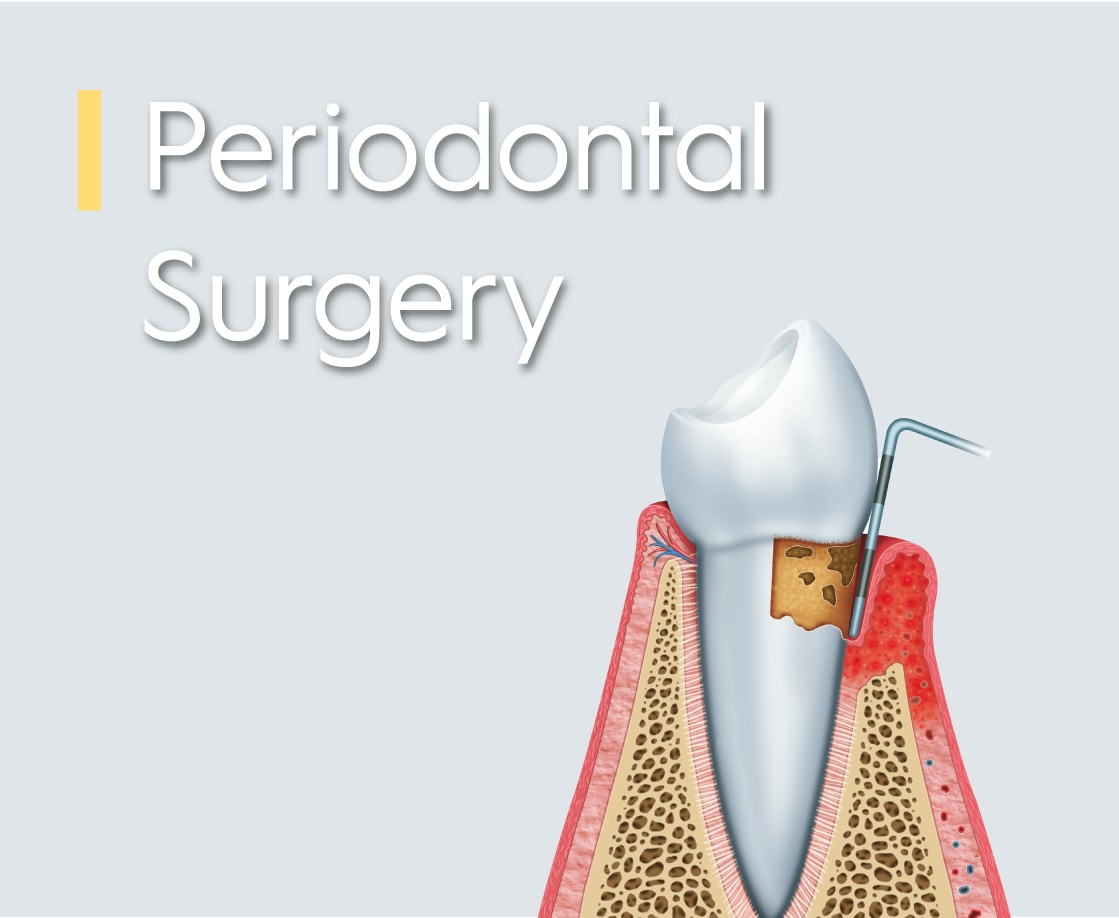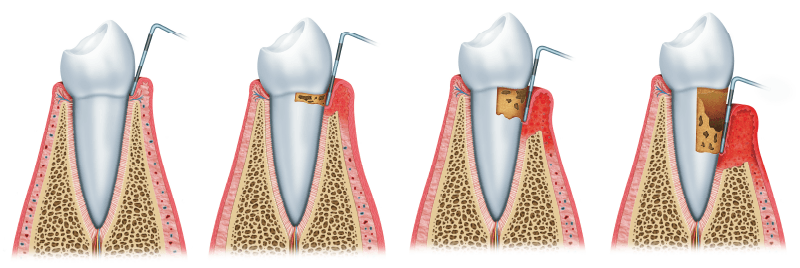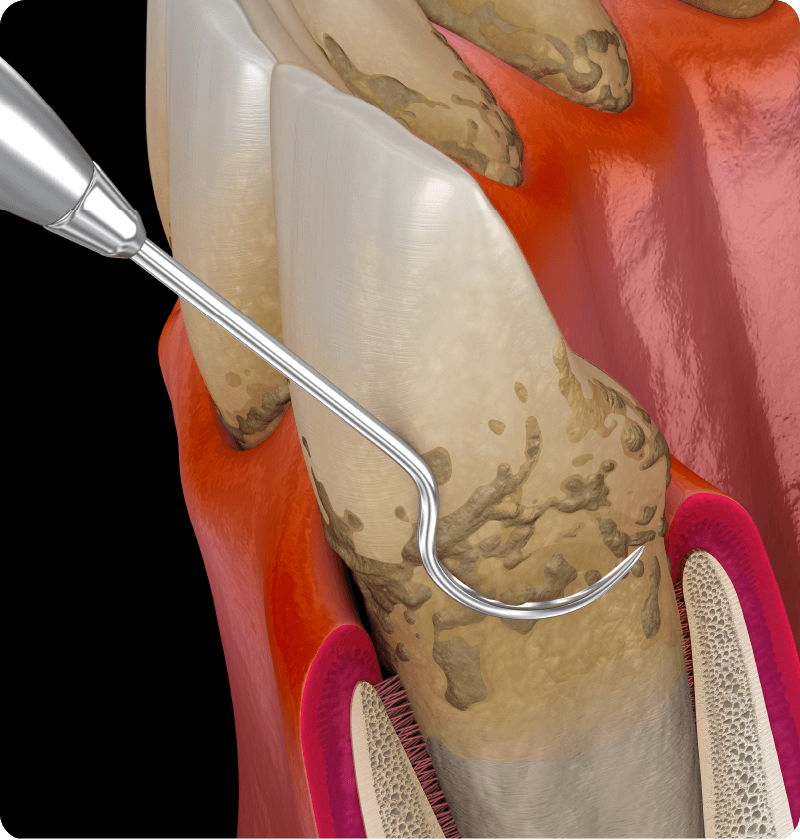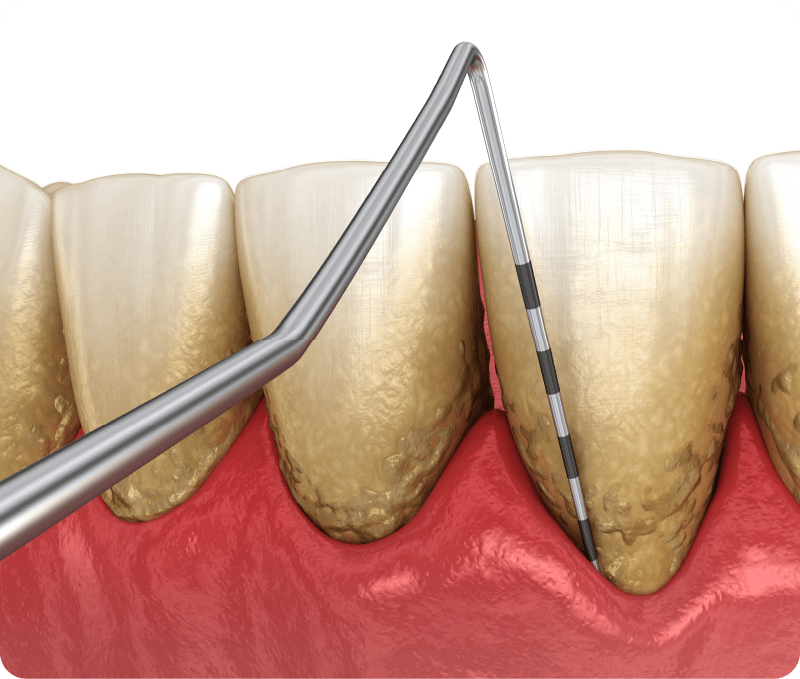

Periodontal Surgery
Periodontal (gum) disease describes the inflammation of tissues surrounding teeth. It is initiated by the release of toxins from bacteria in the dental plaque that accumulates along the gingival margin.
As the disease progresses, gum recedes, patients experience hypersensitivity when having hot, cold, sour, sweet food and beverage. In more serious cases, periodontal disease can cause teeth to become mobile and drift, even be lost. Patients may find it difficult and their teeth weak to chew on, which affect their nutritional intake, health and quality of life.

Initial symptoms: red, swollen and bleeding gums
As dental plaque accumulates at the gingival margin and interdental surface of teeth, bacteria from the plaque secrete toxins that irritate gums, leading to inflammation, this is called gingivitis.
If teeth are not thoroughly cleaned when brushing, and no interdental cleaning aid is used, plaque accumulates on teeth/root surfaces for an extended period of time, with the absorption of minerals from saliva, they become tartar. Tartar has a roughened surface layer, attracts more plaque to accumulate at the gingival margin, this then irritates the gums even more, causing periodontal problems such as swelling, inflammation and bleeding to intensify.
Initial periodontal disease, Gingivitis, can heal naturally if the patient can thoroughly remove the dental plaque daily by using oral care products such as toothbrush, floss and interdental brush.
However, tartar cannot be removed by these daily oral care practices, therefore needs to be removed by dental professionals.
Moderate periodontal disease, periodontitis, requires root surface debridement / root planning
If left untreated, initial periodontal disease (Gingivitis) progresses to moderate periodontal disease (Periodontitis), where alveolar bone surrounding teeth is affected. Loss of bone results in gum recession. The affected teeth appear longer, but this is only an illusion given by the exposed roots of the teeth.
During this stage, continuous inflammation of the periodontal tissues will progressively damage the periodontium. The gums, which were once attached to the root surface, become detached, creating a space called periodontal pocket. Within the periodontal pockets, tartar and plaque accumulate, causing further destruction of alveolar bone and gums.
A root surface debridement / root planing procedure is required to remove the deposits within periodontal pockets and root surfaces. After treatment, periodontal tissues heal and re-attach onto the root surface, the pockets will gradually lessen.
Periodontal surgery to treat severe cases

Severe periodontal disease / Periodontitis can cause significant loss of supporting bone and surrounding gums, further exposing the root of teeth, teeth losing support become mobile and might drift. Pus exudation from periodontal pockets and periodontal abscess may appear frequently. If left untreated, teeth might even be lost by itself.
Periodontal surgery involves opening a gingival flap to expose the root of teeth so that root planing is possible. This procedure is indicated for patients with very deep periodontal pockets. The aim is to remove tartar, plaque and granulation tissues within these deep periodontal pocket with bony defects, creating an optimally clean root surface for periodontal tissues to re-attach and for the periodontal pocket to disappear.

Causal factors
- Build-up of dental plaque
- Smoking
- Stress
- Hormonal changes during pregnancy (pregnancy gingivitis)
- Systemic diseases such as diabetes mellitus, leukaemia, and AIDS
- Intake of medication such as anti-hypertensive and anti-convulsant drugs
Prevention
- Thoroughly remove dental plaque
(toothbrushing and use of interdental cleaning aids such as dental floss or interdental brush) - Regular oral check-up every 6-12 months
- Receive appropriate dental treatment for your condition
- Maintain good physical and mental health
- Refrain from smoking



 Clinic Location
Clinic Location



